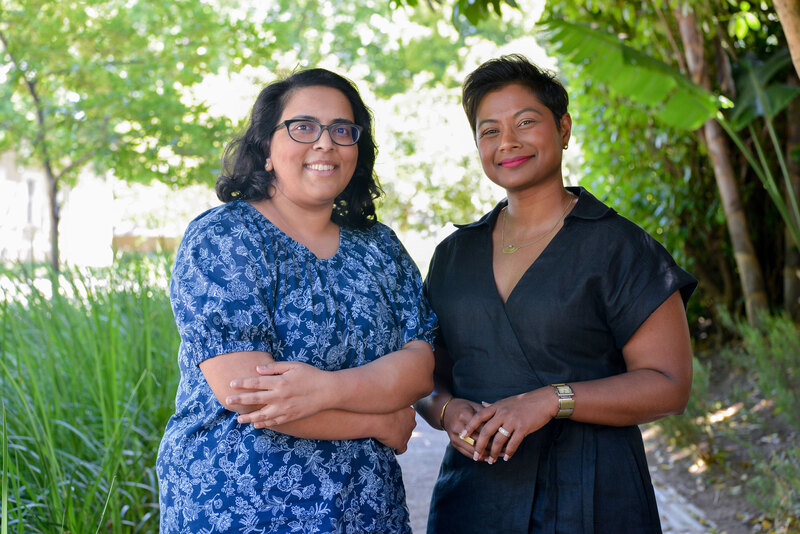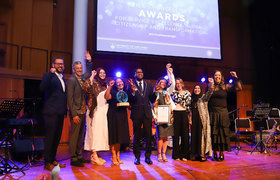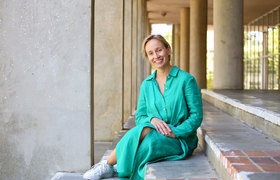Riashna Sithaldeen, Deepti Charitar share VC’s Service Excellence Award
25 November 2025 | Story Niémah Davids. Photo Katherine Rainers. Read time 6 min.
It’s a one-stop-shop for prospective students’ queries, developed in response to their needs as the world reeled from the COVID-19 pandemic. Since its inception, the University of Cape Town (UCT) Chatbot has grown at scale – leveraging technology to provide 24/7 assistance and transforming the way students access information. In recognition of their role with conceptualising and implementing the project, Dr Riashna Sithaldeen and Dr Deepti Charitar were named joint recipients of the 2025 Vice-Chancellor’s (VC) Service Excellence Award.
Dr Sithaldeen is the deputy director and head of the Institutional Information Unit in the Institutional Planning Department and Dr Charitar is a project manager working on the Data Analytics for Student Success (DASS) project. They received their award during the annual UCT Staff Awards on Monday, 24 November.
“This award is incredibly meaningful.”
“This award is incredibly meaningful to us. It recognises the hard work and persistence that has gone into keeping this project going, despite significant challenges. It also recognises not just [the] innovation in our approach, but our commitment to producing a quality service for our students.” Charitar said.
Optimised version of UCT CARES
The UCT Chatbot was the last in a series of developments devised to automate information sharing with students. The first, DestinationUCT, became the UCT Central Advising and Referral Service Bot (UCT CARES), and was later optimised and launched as the UCT Chatbot. The projects were products of UCT’s Academic Advising Initiative, led by Sithaldeen and managed by Charitar.
The idea, Sithaldeen said, sprouted when there was a need to communicate important information related to the First-Year Campus Reception, in real time. The solution was a simple drop-down menu of frequently asked questions (FAQ) that could easily be updated and accessed via WhatsApp.
She said the first project demonstrated how valuable a one-stop, technologically enabled shop for queries could be, especially for new students.
The UCT CARES Chatbot was launched on WhatsApp in August 2021. The rule-based FAQ tool allowed students to choose from a list of questions or request to chat with a live agent to get the information they needed. By 2022, when the UCT Chatbot was launched on the university’s website, natural language processing (NLP) capabilities were included to make sure the bot could understand and respond to students’ queries.
Multilingual Chatbot
What’s cool, the chatbot is multilingual, which means users can access it in their own language and across various time zones. For those students who prefer human interaction, live agents are standing by during office hours to answer their queries.
“The chatbot’s multilingual capability enhances accessibility and inclusivity for a diverse student community,” said Charitar.
“This dataset represents a largely under-utilised resource that could be leveraged to improve operational efficiency around key areas at UCT.”
Further, she said, in May, the artificial intelligence (AI)-powered version of the chatbot was launched, and between May and October, the bot answered more than 145 000 application-related queries and served more than 65 000 users. These queries varied from applications and registration to academic programmes and fees. The chatbot also achieved an average user satisfaction rate of 4.8/5 and requests for live agents dropped from 32% in 2021 to just 8% in 2025. Because the chatbot is accessible across time zones, international applicants benefit too. And Charitar said there are definitely activity peaks during the university’s application cycle, as well as orientation.
“This dataset represents a largely under-utilised resource that could be leveraged to improve operational efficiency around key areas at UCT,” Sithaldeen said.
Plugging a gap
Thanks to the bot’s AI-powered functionality and 24/7 support service, the number of enquiries to UCT’s Admissions Office has dropped significantly too.
But the work doesn’t end there. Charitar and Sithaldeen are currently collaborating with the Faculty of Science to further improve the bot’s functionality, and the goal is to train the bot to respond to faculty handbook queries.
“This work is in the testing phase. But if we are able to get the bot to provide accurate responses quickly, this could be an extremely valuable addition to UCT’s student support ecosystem,” Sithaldeen said.
Celebrating excellence
On receiving the VC’s Service Excellence Award, Charitar and Sithaldeen agreed that it’s a definite highlight for 2025. It recognises their hard work and persistence despite an array of challenges with getting the project off the ground and keeping it going to ensure its success. It also demonstrates their commitment to inclusivity, accessibility and the UCT student experience.
“It also supports UCT’s goals of internationalisation and digital transformation.”
But as with all successes, the duo said theirs would be impossible without many role-players, including the chatbot service provider (SIS Global EduBot), UCT’s Information and Communication Technology Services (ICTS) department, Student Systems Support (SSS), the Communication and Marketing Department (CMD), as well as students who work as live agents. The Admissions Office, Charitar said, has also been a committed partner in this work.
“Beyond its direct operational impact, the chatbot represents the [potential] of technological enablement for the university. It also supports UCT’s goals of internationalisation and digital transformation,” Sithaldeen said.
The chatbot’s knowledge base to accommodate all student queries remains under construction.
 This work is licensed under a Creative Commons Attribution-NoDerivatives 4.0 International License.
This work is licensed under a Creative Commons Attribution-NoDerivatives 4.0 International License.
Please view the republishing articles page for more information.










